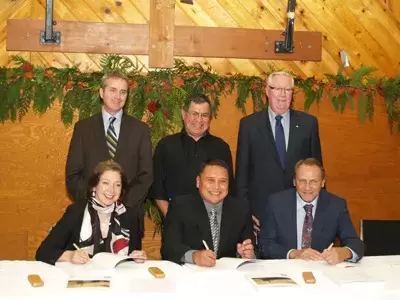Chief negotiators for Canada, British Columbia and the
Tla'amin Nation (Sliammon First Nation) initialed a Final Agreement on Oct.21.
This initialing marks an important step toward a treaty that would bring economic and social benefits to the First Nation and the Powell River region.
"The Tla'amin treaty negotiators have completed negotiations with British Columbia and Canada. It has taken many years to complete the negotiations. The intent of the Final Agreement is to provide a solid foundation for our children and grandchildren," said Clint Williams, Chief of the Tla'amin Nation. "Now that the agreement has been reached, staff will be focused on explaining the benefits of the agreement to the Tla'amin community, in preparation for a ratification vote."
"Our government recognizes the importance of this treaty to the Tla'amin
Nation and remains firmly committed to the treaty process. Today's initialing shows what can be accomplished when parties work together to find solutions," said the Honourable John Duncan, Minister of Aboriginal Affairs and Northern Development. "Today marks a major step toward a bright and prosperous future for the Tla'amin people, and I congratulate the negotiators and leaders on achieving this milestone."
"With 50 per cent of Tla'amin Nation's population under the age of 25, I believe this agreement will ensure that the Tla'amin people have the ability to provide increased economic opportunities for future generations, while continuing to honour their traditions and culture," said Aboriginal Relations and Reconciliation Minister Mary Polak. "As well, the excellent working relationship that has been developed between Tla'amin Nation and its neighboring local government serves as a model for other First Nations and helped create forward momentum during negotiations leading up to this point."
The Tla'amin Final Agreement contains provisions for self-government, financial and land transfers. The land component will consist of approximately 8,322 hectares of treaty lands that include surface and sub-surface resources, and comprised of 1,917 hectares of former Indian Reserves and 6,405 hectares of former Provincial Crown lands.
The Tla'amin Nation will receive a capital transfer of approximately $29.7 million over 10 years, economic development funding of approximately $6.9 million, and a Fishing Vessel Fund of $250,000. B.C. and Canada will each provide $331,292 annually in resource revenue sharing for 50 years.
The treaty also provides for the ownership of forestry resources, as well as domestic fishing, gathering and harvesting rights. Commercial fishing opportunities will be licensed by the Minister of Fisheries and
Oceans and managed under the terms and conditions that apply to other commercial fishers.
The Tla'amin Final Agreement will provide certainty with respect to
Tla'amin Nation's Aboriginal rights and title throughout its traditional territory. The Final Agreement will also provide opportunities for the
First Nation to increase its participation in the regional economy and reduce its reliance on government transfers.
Through self-government, treaty First Nations exercise law-making authority over matters integral to their community, such as health, education, and child welfare. Self-government may also include authority to raise revenues, to manage lands and resources on their lands, and to negotiate with other governments on such matters as joint service delivery and economic development.
As part of the approval process, agreements are signed by chief negotiators and then voted on by eligible First Nation members to ratify. Following community ratification, the provincial and federal governments will undertake their ratification processes.
The Tla'amin Nation has approximately 990 members. Their traditional territory and reserve lands are located just north of Powell River. There are six reserves on just over 1,917 hectares.







